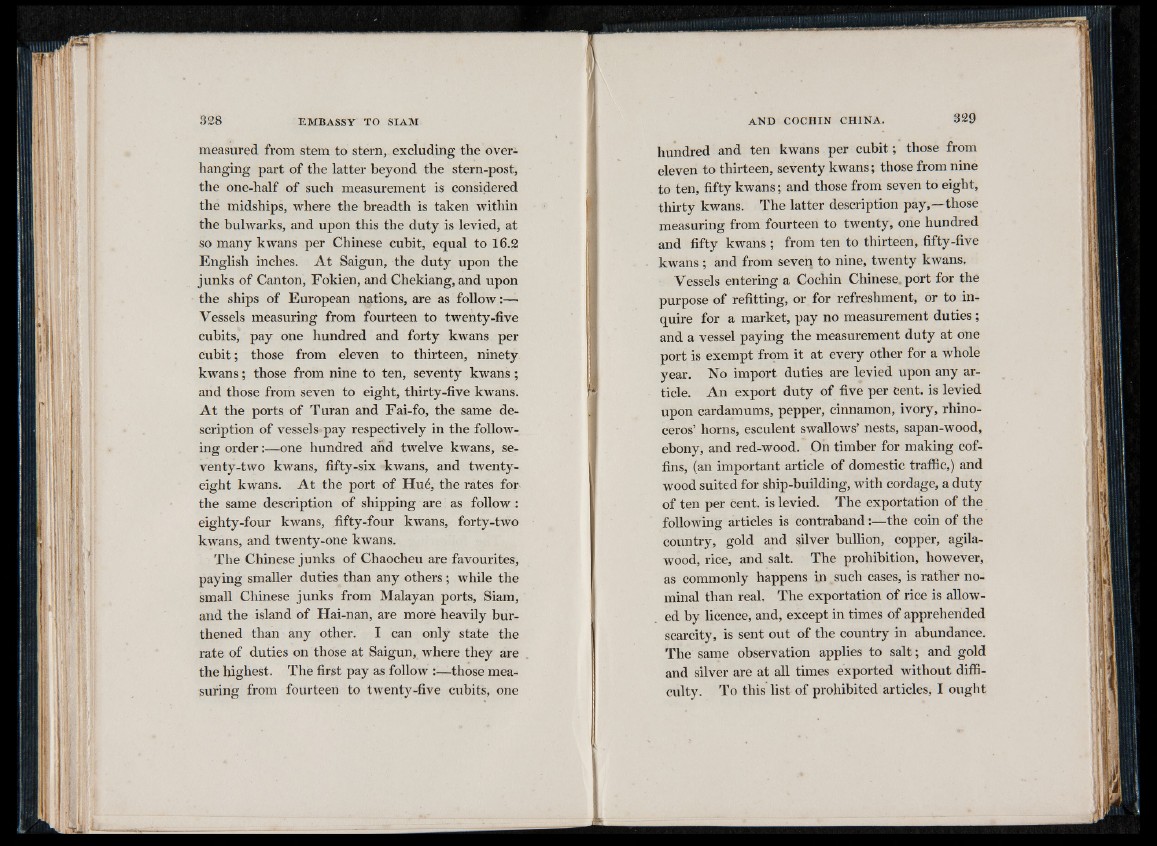
measured from stem to stern, excluding the overhanging
part of the latter beyond the stern-post,
the one-half of such measurement is considered
the midships, where the breadth is taken within
the bulwarks, and upon this the duty is levied, at
so many kwans per Chinese cubit, equal to 16.2
English inches. A t Saigun, the duty upon the
junks of Canton, Fokien, and Chekiang, and upon
the ships of European nations, are as follow :—
Vessels measuring from fourteen to twenty-five
cubits, pay one hundred and forty kwans per
cubit; those from eleven to thirteen, ninety
kwans ; those from nine to ten, seventy kwans ;
and those from seven to eight, thirty-five kwans.
A t the ports of Turan and Fai-fo, the same description
of vessels pay respectively in the following
order :—one hundred and twelve kwans, seventy
two kwans, fifty-six kwans, and twenty-
eight kwans. A t the port of Hué, the rates for
the same description of shipping are as follow :
eighty-four kwans, fifty-four kwans, forty-two
kwans, and twenty-one kwans.
The Chinese junks of Chaocheu are favourites,
paying smaller duties than any others ; while the
small Chinese junks from Malayan ports, Siam,
and the island of Hai-nan, are more heavily bur-
thened than any other. I can only state the
rate of duties on those at Saigun, where they are
the highest. The first pay as follow :—those measuring
from fourteen to twenty-five cubits, one
hundred and ten kwans per cu b it; those from
eleven to thirteen, seventy kwans; those from nine
to ten, fifty kwans; and those from seven to eight,
thirty kwans. The latter description pay,—those
measuring from fourteen to twenty, one hundred
and fifty kwans ; from ten to thirteen, fifty-five
kwans ; and from seven to nine, twenty kwans.
Vessels entering a Cochin Chinese, port for the
purpose of refitting, or for refreshment, or to inquire
for a market, pay no measurement duties ;
and a vessel paying the measurement duty at one
port is exempt from it at every other for a whole
year. No import duties are levied upon any article.
An export duty of five per Cent, is levied
upon cardamums, pepper, cinnamon, ivory, rhinoceros’
horns, esculent swallows’ nests, sapan-wood,
ebony, and red-wood. On timber for making coffins,
(an important article of domestic traffic,) and
wood suited for ship-building, with cordage, a duty
of ten per cent, is levied. The exportation of the
following articles is contraband:—the coin of the
country, gold and silver bullion, copper, agila-
wood, rice, and salt. The prohibition, however,
as commonly happens in such cases, is rather nominal
than real, The exportation of rice is allowed
by licence, and, except in times of apprehended
scarcity, is sent out of the country in abundance.
The same observation applies to salt; and gold
and silver are at all times exported without difficulty.
To this list of prohibited articles, I ought